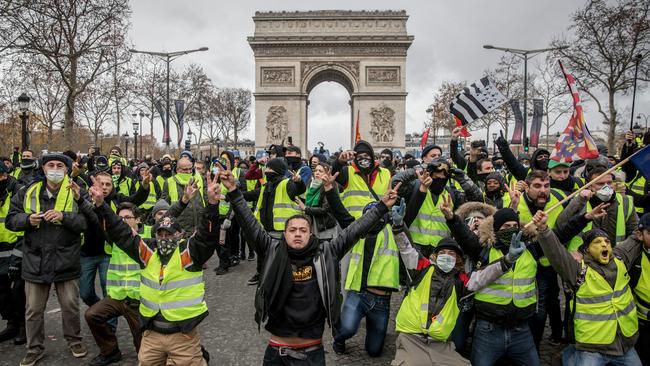
The British Prime Minister’s Brexit is a colossal train wreck. She withdrew her deal with the EU from the House of Commons, after 164 MPs had spoken, mostly against, because she was going to be humiliated by defeat with a losing margin of perhaps 200 in the 650-member chamber.
She has spent two years negotiating nothing with the EU more than the arrangements for the transition period.
And these are so bad, and Britain can escape from them only if the EU agrees, that she has united both Leavers and Remainers in passionate opposition against her. She will scuttle back to Brussels desperately seeking a tweak in the wording, an appearance of modification, some spurious ambiguity she can market to recalcitrant colleagues back home.
May’s taste for humiliation is apparently endless. Brussels is unlikely to give her anything of substance and her political colleagues are so fed up with her endless indecision, vacillating and constant attempts to call black white that they will not fall for Euro-waffle this time.
May’s main chance of getting her vote through the Commons is if the markets, spooked by the unending uncertainty that her weakness and delay have produced, spark such a huge crash that a moment of panic grips Westminster.
So, while the situation is unpredictable and anything is possible, she will most likely return to London, resubmit the same agreement with some marginal garnish of disguise, and lose the vote anyhow.
Perhaps she hopes that if she delays long enough it will simply be too late for her to be replaced before Brexit day itself, March 29.
Almost any road to Brexit would be manageable provided the British system had time to prepare. May’s desperate manoeuvres to hang on to her job, combined with her adamant refusal to make a decision when there is any excuse for delay, mean Britain has no chance to prepare for anything.
She is contriving the worst combination of circumstances for her nation imaginable. So that’s Exhibit A that European politics, like politics in much of the Western world, is broken.
Macron’s humiliation, Exhibit B, is just as comprehensive and equally as startling. Though he won the presidency in May last year with waves of celebrity-like goodwill from the public, he now has an approval rating with his people way below that which Donald Trump enjoys in the US.
Macron was cast not only as the reformer of France but also the new hero of Europe. A passionate advocate of action on climate change, he also wanted deeper political integration for Europe, a European army, a new vision of a Brussels-centric future for his troubled continent, a new model of government for the world. The French people couldn’t care less.
For four weeks now not only Paris but cities around France have burned as the “yellow-vests” movement has protested against all Macron’s reforms. They want lower petrol prices much more than they want climate change activism. The yellow vests the protesters wear symbolise their commitment to their cars. And the yellow-vest movement, despite spasmodic violence and vandalism, is supported by a staggering 75 per cent of the population.
Macron, who had conducted himself with the hauteur of a Hollywood-style hero of the elites, could not make the grand climate summit in Poland. Instead, he had to go home and surrender. Political action now in France doesn’t occur in the National Assembly or the ballot box — it happens in violent encounters on the streets.
Macron’s surrender to the streets was abject. And comprehensive. First, he promised to postpone the fuel tax increases. Then, quickly, he promised to scrap them altogether. France’s budget deficit is at 3 per cent, the EU limit, although most member nations merrily ignore such EU rules. France’s unemployment rate is officially still nudging 10 per cent, although in reality it is much higher.
Macron, in the face of this persistent budget deficit, will now abandon plans to reform France’s pension system. He will introduce an increase in the minimum wage, remove income tax from overtime, introduce untaxed bonuses and increase welfare benefits. Why should public spending in France stop at a paltry 57 per cent of GDP?
France has tried presidencies of the centre-right, the centre-left and the centre-centre. When every version of the centre fails, politics moves to the extremes.
The economy may be unreformable but the irrational power of the streets has been reinforced as the orderly credibility of institutions has declined. In Britain and France, politics is broken. Urgent repair is needed.




Britain’s Theresa May and France’s Emmanuel Macron are two leaders in the midst of desperate crises, and in the process of disorderly and infamous retreats.